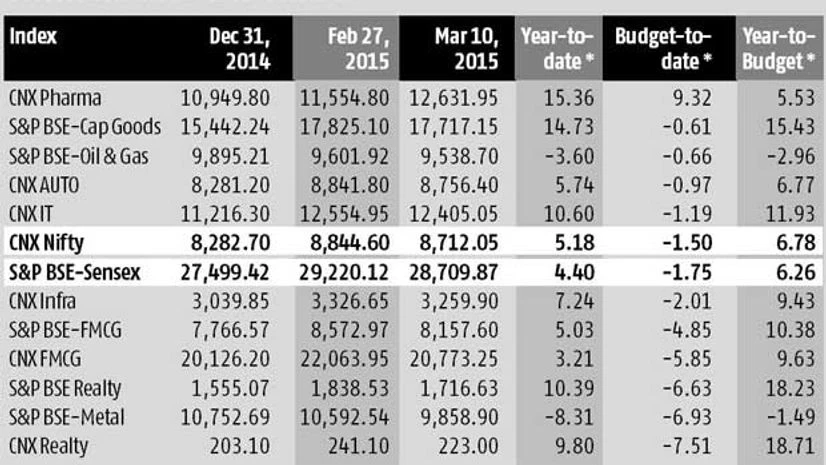Contrary to the expectation that policy- and reform-related stocks might continue to do well after the Union Budget pushed key policy changes across sectors, investors seem to have altered allocations in favour of defensive plays like pharmaceutical stocks.
In the run-up to the Budget in February, stocks from the real estate, infrastructure, capital goods, information technology (IT), fast-moving consumer goods (FMCG) and power sectors outperformed the markets. Their respective indices gained between nine per cent and 19 per cent, compared with a six per cent rise in the BSE Sensex and a seven per cent one for the National Stock Exchange’s Nifty.
However, since presentation of the Budget, NSE's pharma index has outperformed the broader markets with a rise of over nine per cent, compared with a decline of around 1.5 per cent in the benchmark Nifty since the Budget presentation (as of Tuesday).
Now that the two key events — the Union Budget and a rate cut by the Reserve Bank of India (RBI) — are over, analysts expect the markets to remain range-bound over the next six to 12 months, in the absence of any major trigger. However, over the next few months, they say, the markets will closely watch corporate earnings and the growth commentary, besides implementation of the reform-oriented measures announced by the government.
Kotak Securities Chief Executive Officer Kamlesh Rao, for instance, expects the Nifty to range between the 8,750 and 9,500 levels over the next 12 months.
“What will drive the markets from here are sectors and companies that will benefit from soft commodity prices, export-oriented companies, how the spending on the infrastructure sector pans out, and benefits the ancillary industries like cement and road construction will get. Besides, interest rate-sensitive sectors, banks (private ones) and automobile companies should also do well. The infrastructure sector, also sensitive to interest rates, is likely do well; I expect a lot of money to be spent on infrastructure-related projects,” he says.
As regards FMCG, analysts feel a pick-up in the consumption cycle is still a few quarters away. As a result, the related stocks might not do as well in a range-bound market.

In a post-Budget analysis report, Jyotivardhan Jaipuria, India head of research, Bank of America Merrill Lynch, reiterated his positive outlook on the equity markets and said he expected the BSE Sensex to reach 33,000 by the end of December this year.
“However, our near-term view is that we are in a consolidation phase in the market, with a flat to slightly negative return over the next few months. We are overweight on rate-sensitive, operating leverage plays (we are overweight on autos, banks, cement and oil as a reform play). We also have pharma as an overweight to play a tactical consolidation in the market in the near term,” he points out.

)
